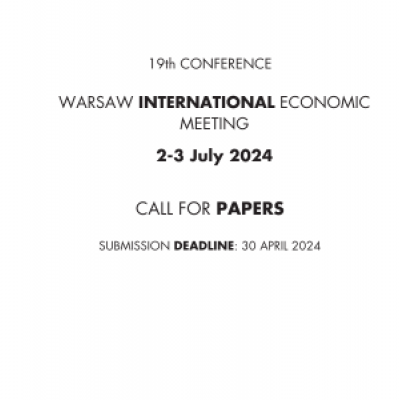“Aggregate shocks and redistribution across generations” – Warsaw Economic Seminars [07.03.2024]
We kindly invite you to take part in the next meeting within the Warsaw Economic Seminars series, organised jointly by the Faculty of Economic Sciences, University of Warsaw and the Warsaw School of Economics.
During the meeting Marcin Bielecki, Ph.D. (Department of Macroeconomics and International Trade Theory) will present the research. The co-authors of the research are: Michał Brzoza-Brzezina (SGH Warsaw School of Economics and European Central Bank) and Marcin Kolasa (SGH Warsaw School of Economics and International Monetary Fund).
The seminar will be held on March 7th 2024 at 5 p.m. in hybrid mode: in room A203 B202 at the Faculty of Economic Sciences (Długa 44/50) and via Zoom platform: https://uw-edu-pl.zoom.us/j/93302281672?pwd=VFg3SVg0clkwOWtHZDNMb2F1TW5Bdz09
Meeting ID: 933 0228 1672
Password: 254160
Abstract:
We extend the standard Smets-Wouters New Keynesian model to account for household heterogeneity across the life-cycle dimension. Our model is populated by 80 cohorts of households (aged 20-99) that have access to different types of assets: housing, nominal assets and real assets. Households optimize over the life-cycle and change their portfolio composition both due to life-cycle considerations and in response to aggregate shocks.
We find that shocks can be split into two groups: those that affect all cohorts’ welfare in the same direction (“egalitarian shocks”) e.g. price markup shock, and those that redistribute across cohorts e.g. monetary policy shock.
We estimate the model on the US data from 1960-2023 and extract the historical shocks affecting the US economy. We find that most of the time all cohorts’ welfare co-moves over the business cycle. However, certain cycles, specifically the 1970s oil price shock recessions and the recent Covid-energy crisis recession, involve large redistribution of welfare across cohorts. Over the last business cycle the redistribution was mostly driven by price markup, technology and monetary policy shocks, and was mainly transmitted via asset return channels.
We view our results as complementary to those obtained through various HANK-type models, and focusing on a separate dimension of household heterogeneity, as in e.g. Bayer et al. (2020).
The calendar of all seminars within the Warsaw Economic Seminars series is available on the website: https://sites.google.com/site/warsaweconseminars/calendar
--
The aim of the Warsaw Economic Seminars series is to create a platform for researchers and specialists from all over the world to present their research and share knowledge on economics and economic policy.
The participants can both listen to presentations and take part in discussions and present their own research to get feedback from other researchers and students.


